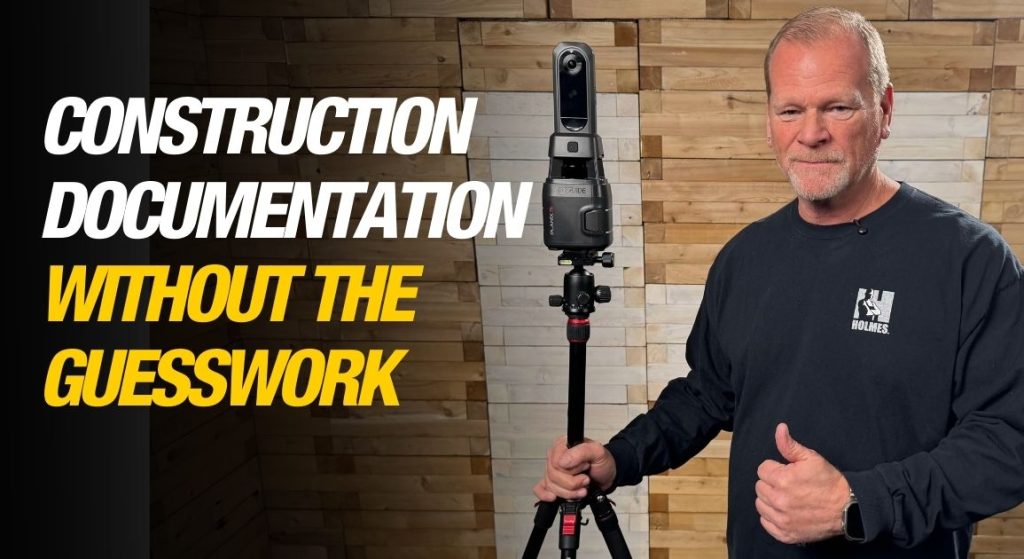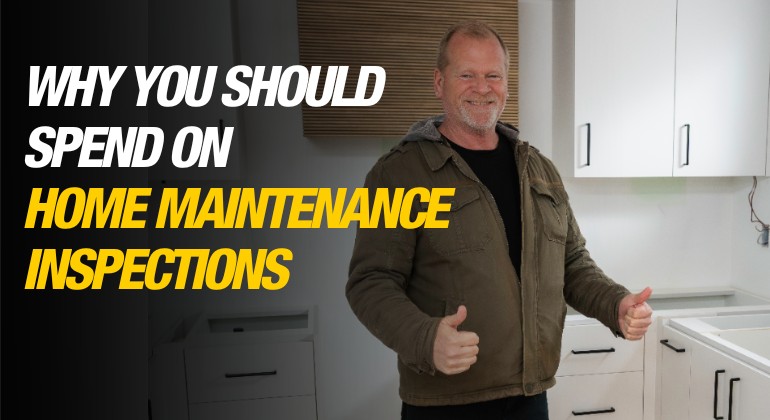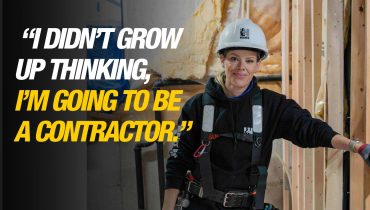In celebration of Women in Construction Week, I thought I’d share my construction journey. People often assume I was born knowing I’d work in construction. When your last name is...
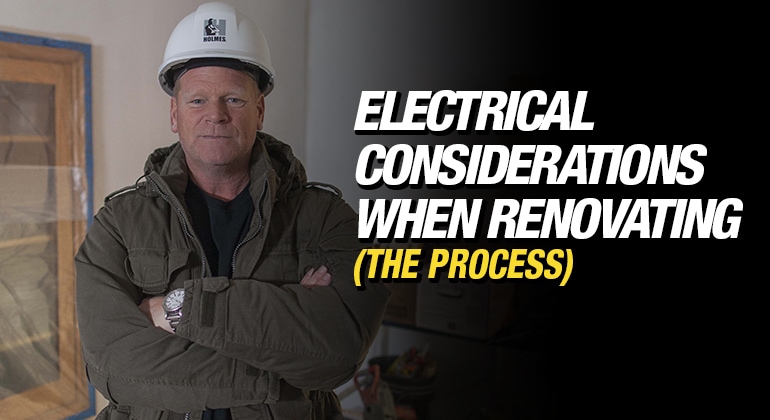
Electrical Considerations When Renovating (The Process)
By Mike Holmes
Mike’s Advice / Home Renovation
Tuesday, September 28th, 2021 @ 10:10am
When buying or renovating an older home, you can usually expect a mix of wiring, aluminum and/or copper, knob and tube, or a combination of all three. While homes started off in the early 1900s with knob and tube wiring, that was quickly replaced with aluminum wiring in the ’60s and ’70s. This was followed by modern copper wiring that can be found in most new homes today. In this article, I will take you through electrical considerations when renovating.
Electrical Considerations on a New Renovation
Pair old wiring with the increase in home improvements, like home offices, better lighting, basement apartments, hot tubs, and people spending more time at home, and you will find that the risk of electrical fires and shocks has risen. This risk is compounded if the work is done in a non-compliant manner.
If you are taking on a new renovation, a new build, or buying a new home altogether, here are some things you should know when it comes to your electrical.
RELATED
Are Older Homes Better? Here’s What you Need to Know about Older Homes.
Is Aluminum Wiring Safe?
While copper wiring is today’s standard and what is recommended, according to the Electrical Safety Authority (ESA), aluminum wiring itself is safe when properly connected and terminated without damaging the wire.
You must also check that your devices and appliances are approved for use with aluminum wire. If your devices are incompatible, this can result in an electrical arc occurring, which could lead to an electrical fire in your home.
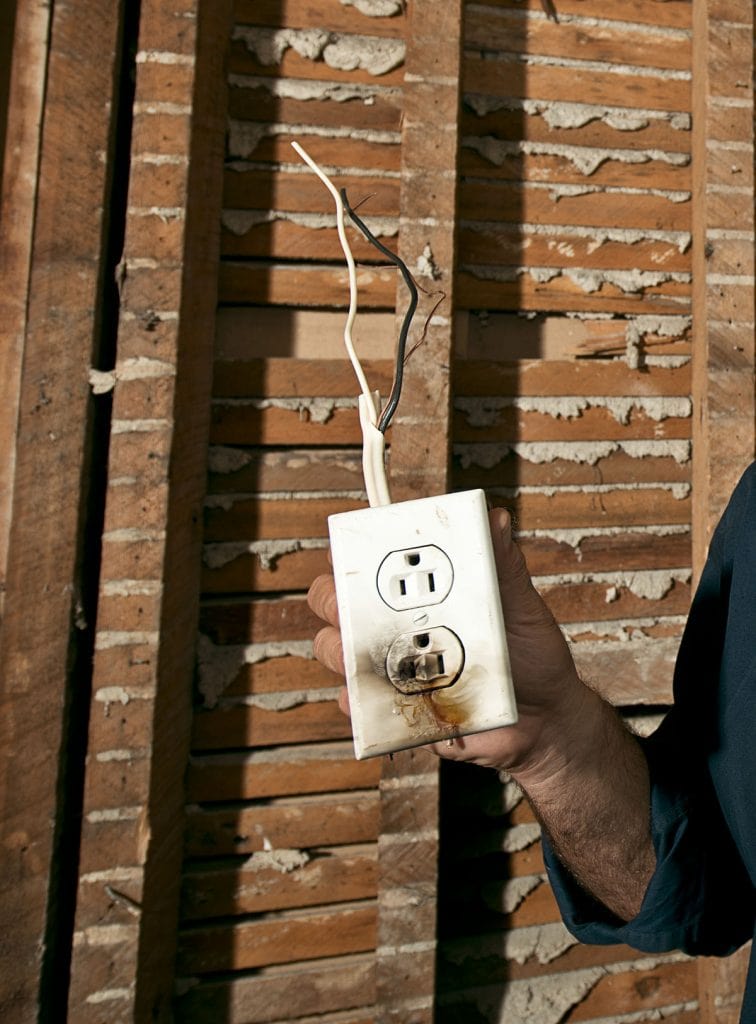
Discolouration of switches or receptacles is a sign of electrical arcing
Electrical arcing could be occurring if you spot any of these signs:
- Warm cover plates or outlets or switches
- Discolouration of switches or receptacles
- Flickering or dimming lights
- Bulbs that burn out too often
- Tripping circuit breakers
- The smell of hot plastic insulation
Does Aluminum Wiring Need To Be Replaced?
While not a must to replace your aluminum wiring, you will find some licensed electrical contractors recommending that especially if you plan to age in your home.
Additionally, some homeowners may find that their insurance companies will not provide or renew insurance coverage unless the wiring is inspected or replaced as necessary.
You should check your exact insurance company’s requirements, but one of the ways to go about that is to have a Licensed Electrical Contracting Business come in, review, check the wiring, and provide a certificate or a letter to the insurer with the findings.
What is Knob and Tube Wiring?
The main difference between knob and tube and modern wiring is that there is no ground wire, so the system cannot accommodate 3-pronged plugs. This in turn increases the risk of shocks and fires.
Basically, the black and white wiring is separate in knob and tube, while in modern wiring, the black, white, and ground wire are together in a single cable.
Is Knob And Tube Wiring A Fire Risk?
Since knob and tube cannot accommodate any electrical items with 3-pronged plugs, the risk of shocks and fire is much greater. Today, our modern homes have many more electrical appliances and components, like TVs, sound systems, computers, washers, dryers, etc. that the old knob and tube just can’t handle.
In addition, house insulation should never be installed over knob and tube wiring. This is a fire hazard waiting to happen. The problem is that the wiring itself is insulated in cloth and rubber, and generally needs lots of space around it to dissipate the heat that builds up when an electrical current is flowing through. If it is surrounded by insulation, it will have no room to do so. This could lead to a very dangerous situation.
RELATED
ELECTRICAL FIRE TIPS, Tips to Protect Your Home From Electrical Fires.
How Can I Identify If There Is Knob and Tube Wiring In My Home?
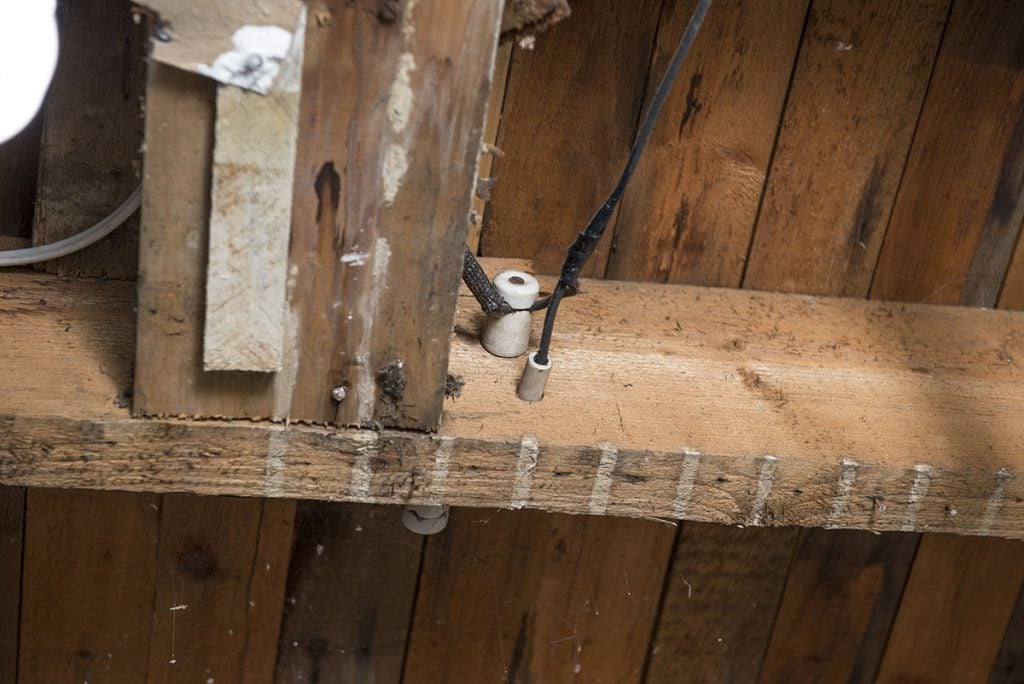
Knob and tube wiring was common in houses built from the 1900s to the 1940s
If you have any exposed walls, look for wires running through porcelain cylinders or “tubes” inserted in wooden floor joists as that can indicate that you have knob and tube wiring. You will also see porcelain “knobs,” which keep the wires secure and prevent them from touching wood, and the cables are usually insulated in a rubberized fabric coating.
However, just because it cannot be seen, it does not mean you do not have it. Sometimes the only way to confirm that you have a knob and tube is to hire a Licensed Electrical Contracting (LEC) business or home inspector to open up the walls or send a tiny camera inside the walls.
I remember a home we fixed in season 5 of Holmes on Homes™ that had a very bad electrical job done, we had to rewire the entire house. That meant opening up all the walls to repair the wiring which was a lot of extra work, but we had to make it right.

An electrical nightmare with an incredible amount of junctions hidden in the ceiling.
Do I need to get an Electrical Inspection when Buying a New House?
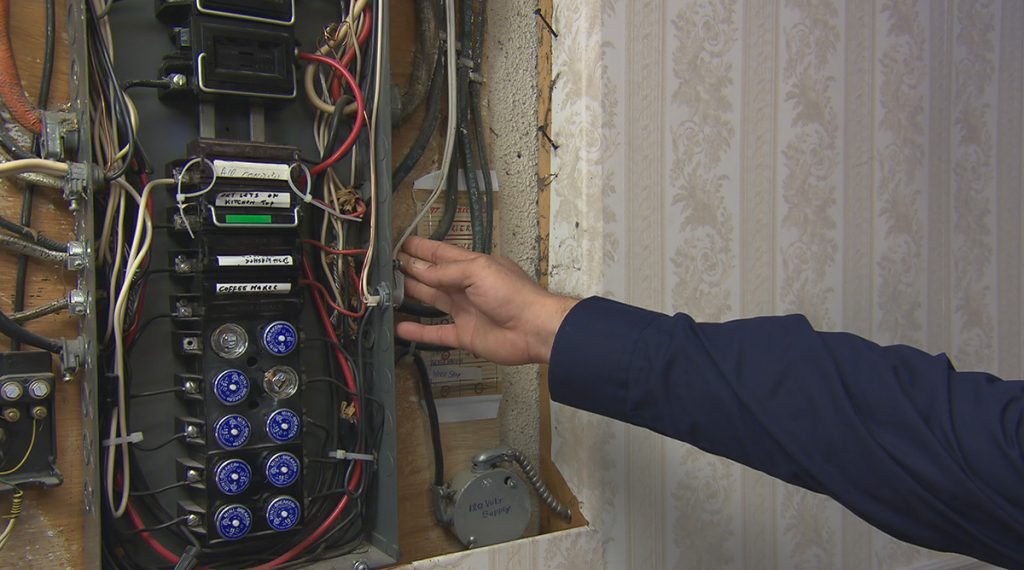
If you have any concerns about the electrical, consult with a licensed electrical contracting business.
A home inspection provides a snapshot of the condition of the home or building at the time of inspection and the purpose is to identify any major deficiencies. However, remember a home inspection is a visual non-invasive inspection. Inspectors can’t make holes in the walls to see inside – they make an educated evaluation based on their knowledge and experience. Some inspectors have thermographic cameras, which I always recommend.
I recommend hiring a Licensed Electrical Contracting Business to specifically assess your electrical system.
I always recommend getting a home inspection —no exceptions. If an inspector sees red flags during the home inspection, they should suggest you hire a specialist to investigate further. In this case, it would be a Licensed Electrical Contracting Business.
Note:
Newly built homes must go through a series of inspections with their local building authority, called staged inspections. However, before homeowners take possession of their new home, new homebuilders must conduct a PDI – a Pre-Delivery Inspection. This is when the final inspection will be done.
Who Should I Hire For My Electrical Work? Electrical Considerations.
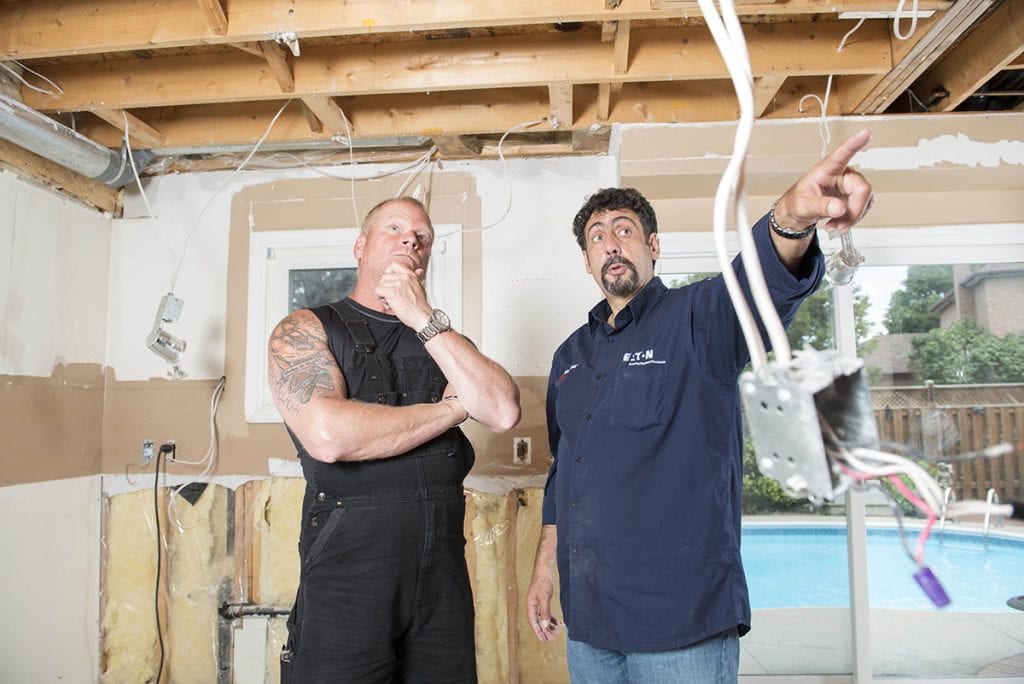
I work with Frank, a licensed electrical contractor on all my jobs.
When hiring someone to perform electrical work, you must always hire a Licensed Electrical Contracting (LEC) business. They are the only electrical business that can be hired to do electrical work for the public in Ontario. They are also the only business that can file a notification of work (“permit”) with the Electrical Safety Authority (ESA) to review and ensure the safety of the electrical work completed in the home or business.
A LEC business can hire Master Electricians to manage the work and Certified Electricians to do the work, but the only person legally allowed to be hired by homeowners to do electrical work, is a Licensed Electrical Contracting Business. You cannot hire a Master or certified electrician directly to do work in your home.
RELATED
How Can I Find A Licensed Electrical Contracting Business?
If you live in Ontario, you can head to FindAContractor.ESAsafe.com to find a LEC business in your area. To be sure you are getting a licensed professional always:
- Ask for a LEC license number and look for the ECRA/ESA logo
- LEC businesses will have a seven-digit license number issued by ESA that always starts with the number “7”
- LEC businesses should prominently display the ECRA/ESA logo on trucks, quotes, and contracts
Tip:
For other provinces, check with your local electrical authority, as each province and territory regulates electrical safety in Canada.
RELATED
Do I Need to Get a Permit?
Permits ensure a project or service is performed correctly, inspected, and complies with the local standards and electrical codes. They exist to help keep you safe, and a permit provides backup should any problems arise.
Tip: Permits are essential when selling your home, as they are proof that the work has been completed and adequately inspected.
Generally, it’s the homeowner’s responsibility to ensure all the proper building permit applications have been filed and obtained for the house even when hiring someone else to do the work.
However, when hiring someone to perform electrical work an electrical permit, or notification of electrical work, must be filed with the Electrical Safety Authority by the LEC, and not the homeowner. This is separate from a building permit. Only the person performing the electrical work can file a notification. It’s a red flag if your contractor asks YOU to file it!
When To File For An Electrical Permit?
A notification of electrical work or a permit must be issued for any of the following work:
- Any time a circuit or wire is being altered, changed, or added to your home
- If you are replacing your wiring or replacing your load centre
- Adding an addition to your home, adding a new light that requires new wiring
- Anything that requires a change in your wiring
Tip – Be sure to get a copy of the ESA Certificate of Acceptance from your Licensed Electrical Contracting Business for your records.
READ NEXT
